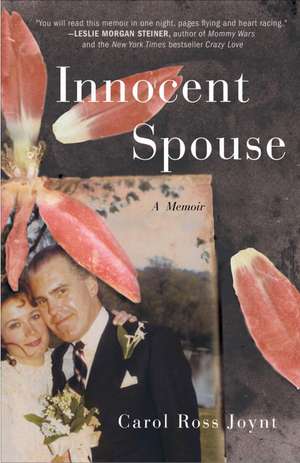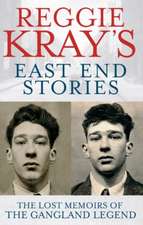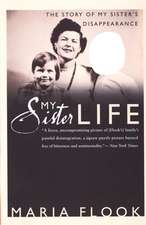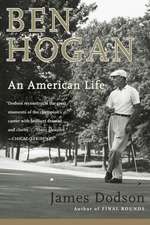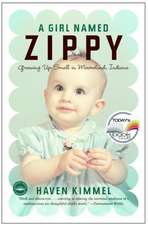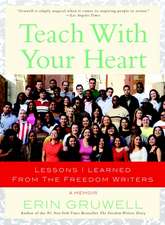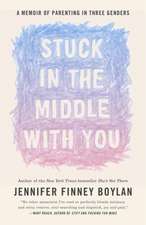Innocent Spouse
Autor Carol Ross Joynten Limba Engleză Paperback – 19 noi 2012
Carol Ross Joynt was a successful TV producer and award-winning journalist in Washington, D.C. Her husband, Howard, owned a legendary restaurant in Georgetown. They had a young son, a happy marriage ߝ a seeming fairy-tale life. But Howard’s sudden death changed everything. Carol was shocked to discover that her husband had secrets ߝ financial secrets ߝ including a $3 million debt to the IRS that still had to be settled. Carol was responsible for repaying the debt, unless she could prove she knew nothing about Howard’s fraudulent dealings and convince the government she was an innocent spouse.
With no time to grieve, Carol was forced to immediately learn to manage her family’s legal and financial responsibilities, run Howard’s restaurant, hold her own career together, and raise their son as a solo parent. As she picked up the pieces and coped with her sadness and anger, she learned to become self-sufficient. Poignant, eye-opening, and at its core uplifting, Innocent Spouse is ultimately an inspiring story of strength and newfound independence in the face of loss and betrayal.
Preț: 111.10 lei
Nou
Puncte Express: 167
Preț estimativ în valută:
21.26€ • 22.11$ • 17.79£
21.26€ • 22.11$ • 17.79£
Carte disponibilă
Livrare economică 21 februarie-07 martie
Preluare comenzi: 021 569.72.76
Specificații
ISBN-13: 9780307592118
ISBN-10: 0307592111
Pagini: 282
Dimensiuni: 133 x 204 x 15 mm
Greutate: 0.22 kg
Editura: BROADWAY BOOKS
ISBN-10: 0307592111
Pagini: 282
Dimensiuni: 133 x 204 x 15 mm
Greutate: 0.22 kg
Editura: BROADWAY BOOKS
Recenzii
"One can easily imagine the ladies of “The View” grilling Washington journalist Carol Ross Joynt about the financial and emotional soap opera chronicled in Innocent Spouse, her memoir of love, death, betrayal, survival, re-invention and major name-dropping."--The Washington Post
"INNOCENT SPOUSE does a great job of highlighting a huge tax problem and
is entertaining to boot. A page-turning read about unexpected reversals of fortune."--Forbes
"There are many memoirs by women who don't know their husbands until they die...but none has the brutal irony of "Innocent Spouse...What makes this memoir exceptional is Carol Joynt's unending honesty. She doesn't spare herself --- on many pages, she really does come off like an idiot...But she perseveres. She learns. She gets it right."--Jesse Kornbluth, HeadButler.com
"A page-turning, name-dropping memoir..."-InStyle
"When a husband dies suddenly he often leaves his widow holding the bag. The choice is to crumble or carry on. Carol Joynt not only carried on but she came through victorious."--Joan Rivers
"Carol Ross Joynt is more than an Innocent Spouse; her indomitable spirit prizes through in this compelling memoir of growth and accomplishment. In the flood of widow memoirs, hers will stand out as a story of overcoming financial ruin, professional and personal deceptions, as well as losing the man she believed was the love of her life."ߝSally Ryder Brady, author of A Box of Darkness
"For those who read The Pilot's Wife by Anita Shreve and wondered how a loving husband could possibly keep a secret life hidden from his family, wonder no more: Carol Joynt reveals in sad and searing detail how it can happen and the price she, as a wife, had to pay to save herself and her young son."--bestselling author Kitty Kelley
"A searing personal journey where the pages fall away from one’s hand like meat from a bone. Ms. Joynt takes on her life with both a hatchet and a scalpel and is unafraid to turn an unerring spotlight on herself, examining the flaws and mistakes from every angle. Yet what emerges from this fascinating story is a courageous woman who is a survivor and above all else a mother who would do anything for her child."--bestselling author David Baldacci
"Think you know your husband? Read this book. Carol Joynt takes us on a harrowing roller-coaster ride through a system that viewed her as guilty until she proved her innocence. A riveting, inspirational account of one woman's dreamy life turned nightmare and her ultimate triumph. I couldn't put it down."--bestselling author Jane Stanton Hitchcock
"An utterly compelling story of spousal deception, postmortem forgiveness, how NOT to run the hottest restaurant in DC, and the enduring power of love. You will read this memoir in one night, pages flying and heart racing."-- Leslie Morgan Steiner, author of Mommy Wars and the New York Times bestseller Crazy Love
"An honest telling of a woman betrayed by her husband whom she had loved and her determination to protect herself and her son."--Publishers Weekly
"Engagingly written. . . .Very readable...inspiring."--Booklist
"Excellent recounting of the author’s lost decade, during which she rebuilt her life, became self-sufficient and found peace following her husband’s deceit."--Kirkus
From the Hardcover edition.
"INNOCENT SPOUSE does a great job of highlighting a huge tax problem and
is entertaining to boot. A page-turning read about unexpected reversals of fortune."--Forbes
"There are many memoirs by women who don't know their husbands until they die...but none has the brutal irony of "Innocent Spouse...What makes this memoir exceptional is Carol Joynt's unending honesty. She doesn't spare herself --- on many pages, she really does come off like an idiot...But she perseveres. She learns. She gets it right."--Jesse Kornbluth, HeadButler.com
"A page-turning, name-dropping memoir..."-InStyle
"When a husband dies suddenly he often leaves his widow holding the bag. The choice is to crumble or carry on. Carol Joynt not only carried on but she came through victorious."--Joan Rivers
"Carol Ross Joynt is more than an Innocent Spouse; her indomitable spirit prizes through in this compelling memoir of growth and accomplishment. In the flood of widow memoirs, hers will stand out as a story of overcoming financial ruin, professional and personal deceptions, as well as losing the man she believed was the love of her life."ߝSally Ryder Brady, author of A Box of Darkness
"For those who read The Pilot's Wife by Anita Shreve and wondered how a loving husband could possibly keep a secret life hidden from his family, wonder no more: Carol Joynt reveals in sad and searing detail how it can happen and the price she, as a wife, had to pay to save herself and her young son."--bestselling author Kitty Kelley
"A searing personal journey where the pages fall away from one’s hand like meat from a bone. Ms. Joynt takes on her life with both a hatchet and a scalpel and is unafraid to turn an unerring spotlight on herself, examining the flaws and mistakes from every angle. Yet what emerges from this fascinating story is a courageous woman who is a survivor and above all else a mother who would do anything for her child."--bestselling author David Baldacci
"Think you know your husband? Read this book. Carol Joynt takes us on a harrowing roller-coaster ride through a system that viewed her as guilty until she proved her innocence. A riveting, inspirational account of one woman's dreamy life turned nightmare and her ultimate triumph. I couldn't put it down."--bestselling author Jane Stanton Hitchcock
"An utterly compelling story of spousal deception, postmortem forgiveness, how NOT to run the hottest restaurant in DC, and the enduring power of love. You will read this memoir in one night, pages flying and heart racing."-- Leslie Morgan Steiner, author of Mommy Wars and the New York Times bestseller Crazy Love
"An honest telling of a woman betrayed by her husband whom she had loved and her determination to protect herself and her son."--Publishers Weekly
"Engagingly written. . . .Very readable...inspiring."--Booklist
"Excellent recounting of the author’s lost decade, during which she rebuilt her life, became self-sufficient and found peace following her husband’s deceit."--Kirkus
From the Hardcover edition.
Notă biografică
CAROL ROSS JOYNT started her three-decade career in journalism with the wire services and Time magazine before becoming a writer for Walter Cronkite on CBS Evening News. She went on to work as a producer and writer for NBC News, The CBS News Nightwatch, USA Today: The Television Show, This Week with David Brinkley, Nightline, Larry King Live, and Hardball with Chris Matthews. Upon her husband’s death, Joynt inherited his landmark Georgetown restaurant, Nathans, where she created an interview program, The Q&A Café. Today, in addition to hosting the show, Carol writes a weekly column about Washington for NewYorkSocialDiary.com.
From the Hardcover edition.
From the Hardcover edition.
Extras
Joynt: INNOCENT SPOUSE
Chapter 1
We were stuck in heavy Friday afternoon rush-hour traffic on M Street, the main thoroughfare in Georgetown. It was January. Everyone was headed home at the same time. I slammed the horn at the slowpoke ahead of me every time he cost me another yellow light. I wasn’t panicked, but I was frustrated. We needed to go, not sit at a light. From the backseat my husband, Howard, groaned at every stop, start, lane change, and pothole. He was on his back, gasping for breath, and braced himself with his arms.
We did not talk except for my repeated question, “How are you?” And his faint repeated answer, “Every time you hit a pothole it’s a stabbing pain.” I listened to the all-news radio station to make sure my route was clear. The announcers’ voices droned through news updates, commercial breaks, two-minute interviews, and weather. In a way it was so utterly ordinary—the car, the traffic, the potholes, the radio. We might have been on our way to the supermarket. Except we weren’t. We were headed to the emergency room at Sibley Hospital, and I was focused like a laser on the road.
When we pulled into the drive I stopped at the door and jumped out. “I’m gonna get a nurse. I’ll be right back.” My voice was urgent but calm. Calm enough, anyway. I ran inside, through the lobby and to the desk. “I need a nurse! My husband’s in the car. He can barely breathe.”
The nurse opened the back door, did a quick survey of Howard, and asked, “Can you walk in or do you need a wheelchair?” He said he could walk. We both helped him out of the car. At six foot three he would have towered over us but he was hunched over in pain. His face was pale. His usually slicked-back silver hair was in disarray. His trousers and sweater were loose.
The nurse bolstered Howard with her shoulder under his arm. Their pace was slow, careful. I left him with her. By the time I parked, gave the admission’s clerk the necessary insurance information, and found Howard in the warren of examining rooms, there was an oxygen mask over his face, an IV in his arm, and a young doctor and two nurses hovering over him. His eyes locked with mine. I saw fear. My gut tightened.
“Your husband has bad pneumonia,” the doctor said, shoving an X-ray into a wall-mounted light box. His tone was anxious, even a little frazzled. He pointed at the black-and-white picture of my husband’s lungs, one quite obviously cloudy and white. “One lung is fully compromised,” he said, pointing to the film like a teacher lecturing a class. “We can’t let it spread to the other. We’re sending him up to the ICU. We have work to do.”
I’d brought in a time bomb, but I consoled myself that Howard could talk and his eyes were open. Heck, I thought, people survive pneumonia all the time. Pneumonia is fixable. Maybe he’ll be in the hospital a couple of days. He’ll learn his lesson about avoiding the doctor until too late.
The medical team disappeared through the drawn white curtain. We were alone. Howard asked for water. “Evian, please.”
How sick can he be if he’s picky about the water? I stood as close to him as possible, careful not to disturb the tubes and wires. “I’ll get some bottled water later. D.C. water will do for now,” I said. “This looks like a close call. Thank God I didn’t stay longer in New York. Not that it matters now, but I’ll never understand why you told me you’d seen Dr. Goldstein.” He didn’t respond but slowly closed his eyes. He didn’t want to hear about it. So I made upbeat small talk. Even though it was loud and crowded in the emergency room, and the curtain was regularly pulled back and closed again by busy nurses and technicians, the moment felt oddly intimate, personal, another experience in our journey together. He was scared and I was there to help take care of him, to calm his fear.
I found a wall phone outside Howard’s treatment bay. My first call was to Howard’s sister, Martha, in New Castle, Delaware. “I’m at Sibley. Howard has bad pneumonia. That’s all I know. They’re sending him to the ICU.”
She didn’t ask any questions. “I’m on my way. It’ll probably be three hours.”
I called my office at CNN’s Larry King Live, and talked to the executive producer. “You’re not gonna believe this. I’m at Sibley. Howard has bad pneumonia. I found him flat on his back in bed when I got home from New York.”
She was alarmed. “What can we do?”
“I don’t know.” I said. “I’ll get back to you.”
I made the same call to Nathans, Howard’s restaurant in Georgetown. “What can I do?” the manager asked.
“I don’t know, Stand by. I’ll get back to you.”
My last call was the toughest. Home. As we were leaving for the hospital, Howard had paused only long enough to poke his head in on our smiling five-year-old son, playing on the floor of his room with the babysitter. “I’ll be back, big guy,” he said. I gave the babysitter the update and asked to speak to Spencer.
There was something about that little voice at the other end of the line that underscored my altered reality. Spencer seemed so far removed from the drama involving his parents, but it would soon become his drama, too. Blessedly, I suppose, he was too young to understand where I was, what had happened, and what it meant, and therefore at this point it could not scare him. “I’m at the hospital with Daddy,” I said. “There are lots of nice doctors and nurses.”
“Mommy, are the doctors going to fix him?” He knew Howard was not well. After all, for the four days I was away Howard had been home in bed.
“Yes, sweetie. The doctors are going to make him all better. You should have your dinner and get ready for bed, and I’ll be there as soon as possible.”
“Okay, Mommy. Can I talk to Daddy?”
“Soon, but not right now. He’s taking a nap. That’s how they fix him.”
“Okay, Mommy.”
Howard was whisked up to the ICU. Bright lights flooded the room. There were two windows, one with the blinds shut, the other facing the nursing station. There was a lot of equipment, most of it hooked up to him. One of the machines beeped constantly, flashing numbers. He had an IV, possibly two. He was in a gown, under white sheets, propped up by pillows. Was I afraid? No, not then. Not yet. Howard was awake, after all. He talked to me through his oxygen mask. I wet washcloths with cold water, squeezed them out, and pressed them against his forehead. There were lots of people fussing with him. Something was being done. I said to myself, “This is bad for him but routine for them. He’ll be here a couple nights and then home.”
What did I know?
We had gotten to the hospital at five in the afternoon. Very quickly it was pushing nine. The nurse called in a new doctor, who arrived in shirtsleeves and tie but no jacket or white coat. He was friendly but instantly serious when he looked at Howard’s charts and machines. His one good lung was not absorbing enough oxygen. In a whisper, out of Howard’s range, I asked the nurse, “Is this serious?”
She nodded. “We’ve got to get his blood oxygen up.” She pointed to an “85” on the monitor.
“So he’s in serious condition?”
Her voice went flat. “No, he’s critical.”
I turned to the sink and splashed water on my face. It was the only way to hide the rush of tears. The fear arrived with a jolt and made me queasy, woozy, unsteady. My breath stopped somewhere near my breastbone. My mouth was dry. But I couldn’t let myself become unhinged in front of Howard. Composure was essential. I inhaled as deeply as I could, wiped my face, wet another washcloth, turned, and went to him, pressing it against his cheeks and brow. I looked him in the eyes, the beautiful brown eyes I’d known and loved for twenty years. I could see the same fear. “This is no way to spend Friday night,” he said.
“It’s going to be okay,” I said. “You’re in good hands and Martha is on her way. She’ll be here so I can go check on Spencer. You won’t be alone.”
The doctor called me outside. His hands were on his hips, head tilted down toward me, expression engaged but grim. “We have to sedate him. We have to get a tube down into his good lung to get more oxygen into him. I don’t know if it will work but we’ve got to give it a try.” He didn’t call it life support, but that’s what it was. I behaved calmly, but by then I was functioning on pure adrenaline.
Back at Howard’s bedside, the doctor explained the procedure to him while the nurses prepared to put him under. No one offered us a moment alone, nor did we ask for one. It didn’t seem necessary. This was still so simple. They would sedate him, do their work, fix him, and he’d be better. I kissed him awkwardly on the arm or shoulder—whatever part of him it was I could reach—and asked if there was anything I could bring him from home, anything he wanted me to do. His look was woeful. “I want to be back in the Caribbean.”
“Yes,” I said. “Me, too.” I blew him another kiss, grabbed my coat, and headed out the door.
From the Hardcover edition.
Chapter 1
We were stuck in heavy Friday afternoon rush-hour traffic on M Street, the main thoroughfare in Georgetown. It was January. Everyone was headed home at the same time. I slammed the horn at the slowpoke ahead of me every time he cost me another yellow light. I wasn’t panicked, but I was frustrated. We needed to go, not sit at a light. From the backseat my husband, Howard, groaned at every stop, start, lane change, and pothole. He was on his back, gasping for breath, and braced himself with his arms.
We did not talk except for my repeated question, “How are you?” And his faint repeated answer, “Every time you hit a pothole it’s a stabbing pain.” I listened to the all-news radio station to make sure my route was clear. The announcers’ voices droned through news updates, commercial breaks, two-minute interviews, and weather. In a way it was so utterly ordinary—the car, the traffic, the potholes, the radio. We might have been on our way to the supermarket. Except we weren’t. We were headed to the emergency room at Sibley Hospital, and I was focused like a laser on the road.
When we pulled into the drive I stopped at the door and jumped out. “I’m gonna get a nurse. I’ll be right back.” My voice was urgent but calm. Calm enough, anyway. I ran inside, through the lobby and to the desk. “I need a nurse! My husband’s in the car. He can barely breathe.”
The nurse opened the back door, did a quick survey of Howard, and asked, “Can you walk in or do you need a wheelchair?” He said he could walk. We both helped him out of the car. At six foot three he would have towered over us but he was hunched over in pain. His face was pale. His usually slicked-back silver hair was in disarray. His trousers and sweater were loose.
The nurse bolstered Howard with her shoulder under his arm. Their pace was slow, careful. I left him with her. By the time I parked, gave the admission’s clerk the necessary insurance information, and found Howard in the warren of examining rooms, there was an oxygen mask over his face, an IV in his arm, and a young doctor and two nurses hovering over him. His eyes locked with mine. I saw fear. My gut tightened.
“Your husband has bad pneumonia,” the doctor said, shoving an X-ray into a wall-mounted light box. His tone was anxious, even a little frazzled. He pointed at the black-and-white picture of my husband’s lungs, one quite obviously cloudy and white. “One lung is fully compromised,” he said, pointing to the film like a teacher lecturing a class. “We can’t let it spread to the other. We’re sending him up to the ICU. We have work to do.”
I’d brought in a time bomb, but I consoled myself that Howard could talk and his eyes were open. Heck, I thought, people survive pneumonia all the time. Pneumonia is fixable. Maybe he’ll be in the hospital a couple of days. He’ll learn his lesson about avoiding the doctor until too late.
The medical team disappeared through the drawn white curtain. We were alone. Howard asked for water. “Evian, please.”
How sick can he be if he’s picky about the water? I stood as close to him as possible, careful not to disturb the tubes and wires. “I’ll get some bottled water later. D.C. water will do for now,” I said. “This looks like a close call. Thank God I didn’t stay longer in New York. Not that it matters now, but I’ll never understand why you told me you’d seen Dr. Goldstein.” He didn’t respond but slowly closed his eyes. He didn’t want to hear about it. So I made upbeat small talk. Even though it was loud and crowded in the emergency room, and the curtain was regularly pulled back and closed again by busy nurses and technicians, the moment felt oddly intimate, personal, another experience in our journey together. He was scared and I was there to help take care of him, to calm his fear.
I found a wall phone outside Howard’s treatment bay. My first call was to Howard’s sister, Martha, in New Castle, Delaware. “I’m at Sibley. Howard has bad pneumonia. That’s all I know. They’re sending him to the ICU.”
She didn’t ask any questions. “I’m on my way. It’ll probably be three hours.”
I called my office at CNN’s Larry King Live, and talked to the executive producer. “You’re not gonna believe this. I’m at Sibley. Howard has bad pneumonia. I found him flat on his back in bed when I got home from New York.”
She was alarmed. “What can we do?”
“I don’t know.” I said. “I’ll get back to you.”
I made the same call to Nathans, Howard’s restaurant in Georgetown. “What can I do?” the manager asked.
“I don’t know, Stand by. I’ll get back to you.”
My last call was the toughest. Home. As we were leaving for the hospital, Howard had paused only long enough to poke his head in on our smiling five-year-old son, playing on the floor of his room with the babysitter. “I’ll be back, big guy,” he said. I gave the babysitter the update and asked to speak to Spencer.
There was something about that little voice at the other end of the line that underscored my altered reality. Spencer seemed so far removed from the drama involving his parents, but it would soon become his drama, too. Blessedly, I suppose, he was too young to understand where I was, what had happened, and what it meant, and therefore at this point it could not scare him. “I’m at the hospital with Daddy,” I said. “There are lots of nice doctors and nurses.”
“Mommy, are the doctors going to fix him?” He knew Howard was not well. After all, for the four days I was away Howard had been home in bed.
“Yes, sweetie. The doctors are going to make him all better. You should have your dinner and get ready for bed, and I’ll be there as soon as possible.”
“Okay, Mommy. Can I talk to Daddy?”
“Soon, but not right now. He’s taking a nap. That’s how they fix him.”
“Okay, Mommy.”
Howard was whisked up to the ICU. Bright lights flooded the room. There were two windows, one with the blinds shut, the other facing the nursing station. There was a lot of equipment, most of it hooked up to him. One of the machines beeped constantly, flashing numbers. He had an IV, possibly two. He was in a gown, under white sheets, propped up by pillows. Was I afraid? No, not then. Not yet. Howard was awake, after all. He talked to me through his oxygen mask. I wet washcloths with cold water, squeezed them out, and pressed them against his forehead. There were lots of people fussing with him. Something was being done. I said to myself, “This is bad for him but routine for them. He’ll be here a couple nights and then home.”
What did I know?
We had gotten to the hospital at five in the afternoon. Very quickly it was pushing nine. The nurse called in a new doctor, who arrived in shirtsleeves and tie but no jacket or white coat. He was friendly but instantly serious when he looked at Howard’s charts and machines. His one good lung was not absorbing enough oxygen. In a whisper, out of Howard’s range, I asked the nurse, “Is this serious?”
She nodded. “We’ve got to get his blood oxygen up.” She pointed to an “85” on the monitor.
“So he’s in serious condition?”
Her voice went flat. “No, he’s critical.”
I turned to the sink and splashed water on my face. It was the only way to hide the rush of tears. The fear arrived with a jolt and made me queasy, woozy, unsteady. My breath stopped somewhere near my breastbone. My mouth was dry. But I couldn’t let myself become unhinged in front of Howard. Composure was essential. I inhaled as deeply as I could, wiped my face, wet another washcloth, turned, and went to him, pressing it against his cheeks and brow. I looked him in the eyes, the beautiful brown eyes I’d known and loved for twenty years. I could see the same fear. “This is no way to spend Friday night,” he said.
“It’s going to be okay,” I said. “You’re in good hands and Martha is on her way. She’ll be here so I can go check on Spencer. You won’t be alone.”
The doctor called me outside. His hands were on his hips, head tilted down toward me, expression engaged but grim. “We have to sedate him. We have to get a tube down into his good lung to get more oxygen into him. I don’t know if it will work but we’ve got to give it a try.” He didn’t call it life support, but that’s what it was. I behaved calmly, but by then I was functioning on pure adrenaline.
Back at Howard’s bedside, the doctor explained the procedure to him while the nurses prepared to put him under. No one offered us a moment alone, nor did we ask for one. It didn’t seem necessary. This was still so simple. They would sedate him, do their work, fix him, and he’d be better. I kissed him awkwardly on the arm or shoulder—whatever part of him it was I could reach—and asked if there was anything I could bring him from home, anything he wanted me to do. His look was woeful. “I want to be back in the Caribbean.”
“Yes,” I said. “Me, too.” I blew him another kiss, grabbed my coat, and headed out the door.
From the Hardcover edition.
